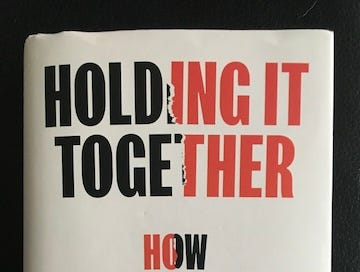Why Don't We Have a Social Safety Net? Because We Have Women
Jessica Calarco's Holding It Together
As I write this, Elon Musk and Vivek Ramaswamy are eagerly looking through the federal budget as part of their pet DOGE project. Naturally, they will be searching for the mystical unicorn that is “waste, fraud, and abuse”. Given that they probably won’t touch military spending, they will likely take steps to weaken our already fragile social safety net.
The movie Dave is one of my all time favorites. Kevin Kline winds up as the stand-in president. There is a great scene where Dave’s friend and accountant played by Charles Grodin comes over to the white house and helps figure out how they could carve enough out of the budget to fund a project Dave desperately wants (because Sigourney Weaver does). This is the conceit behind DOGE but the damage will be much greater.
I’ve been thinking of all this because I recently finished Jessica Calarco’s excellent Holding It Together: How Women Became America’s Safety Net. I’ve been following her work for years on social media. She was a sociologist at Indiana University and had written some excellent stuff on navigating grad school and how to put together a quality PowerPoint presentation. She recently relocated to the University of Wisconsin.
The book draws on survey and interview data from Indiana families who had newborns around 2018. Many of the respondents were part of two other projects running though 2023.
The baseline of the research begins with the challenges faced by young families in Indiana — a state that has a notoriously weak social safety net in a country with insufficient supports. Of course, in the middle of the research timeline we experienced a once in a century pandemic with the resulting health challenges, economic disruptions, and social dislocation.
Who bore the brunt of these challenges? Women did.
Calarco traces the ways in which Ronald Reagan and Milton Friedman argued that we needed to make sure people were deserving of social support and not free riding. That has been the defining concern of both political parties for far too long. If we provided a robust social safety net, they argue, then maybe able bodied people wouldn’t work (or would buy cola with their food stamps!).
Other social forces contribute to the pressures women feel. Motherhood is set forth as an ideal with some social stigma for those without children. A generalized belief in meritocracy suggests anyone can accomplish anything they want. She has a chapter on the Supermom myth which has multiple fronts: women protecting children from the worldly values of schooling, women protecting children from Covid, and women projecting strength in both family and work. She cites the work of John Gray and the “men are from Mars, women are from Venus” nonsense that relegates home and family to women. Men are just not good at “that stuff”.
She has a chapter on the solutions offered by conservatives: marriage before babies, college, and then a good job. More often than not, this is left wanting. There are several stories in the book about women who did “the right things” and then found themselves in precarious positions, couldn’t pursue promotions in spite of talent, and wound up staying home with children. Not because it was ideal but because lack of supports, primarily childcare and health care, removed other options.
Her penultimate chapter examines how the social safety net was extended in response to Covid. We saw cash supplements to families, with extra funds to those with children. We paused student loan payments and had eviction moratoriums. We expanded the child tax credit and medicaid and stop-gapped loans to small (and not small) businesses.
Financial stability resulted (the loss of which made people feel worse off when inflation rose). Child poverty was cut in half. Health outcomes from those not devastated by Covid got better.
And then we let it all go.
Joe Manchin and Krysten Sinema said no to Build Back Better, one of the largest expansions of the social safety net in generations. And just like that, child poverty was back up.
Perhaps misogyny and patriarchy are really that deeply imbedded in our society. Maybe all want to go back to our fictional Dick and Jane family images. Maybe we’re simply unwilling to deal with the reality of social inequality as long as the market is doing well and billionaires are happy with the incoming administration.
What Jessica’s book makes crystal clear is that our social safety net has all these holes because we’ve decided as a society it’s how things are supposed to be. But the Covid response makes clear that these are actually choices we make time and time again.
Why is it so easy for politicians (especially conservative ones) to believe that tax cuts for corporations and the wealthy will lead to economic growth and therefore be budget neutral (which is never true)? What is preventing us from applying similar logic to providing paid family leave for newborns, adequate child care, and flex time on the job? Wouldn’t that also stimulate the economy while lessening family precarity?
We don’t pursue these reasonable options because those in legislators and think tanks simply don’t want to. But we could if we put enough pressure on. Jessica Calarco’s book helps us know how to do that.




